October 2018: Olive Tree

Volume II/Issue 30/October 2018


From The Editorial Desk:
Anger, Bitterness and Rage
What is Meant by Anger, Bitterness and Rage?
It has been observed that man has primary and secondary emotions. Primary emotions are emotions that are very basic in all people and commonly understood between them. Anger is considered a primary emotion. The dictionary defines anger as “a strong feeling of displeasure and belligerence aroused by injury, injustice or wrong.” Since the displeasure comes from injury, injustice or wrong, any creature capable of sensing pain in a physical sense, or evil in a moral sense is generally capable of some expression of anger.
The Scriptures refer to God’s anger nearly two hundred times and His wrath over one hundred times. Since God cannot be tempted with evil, we can conclude anger in itself is not wrong. However, since anger is such a strong emotion, it very often can overpower a person’s better judgment and lead him into wrong doing.
Bitterness and rage are merely words that describe the different forms or expressions of anger. Bitterness is “characterized by intense hostility or antagonism.” We often use this word to describe an attitude of resentment a person may have against a situation or person that burns over a long period of time. Rage is used to describe “a state of anger so intense it resembles insanity.” Many times when the Bible uses the term wrath it is a synonym for our use of rage.
Earlier we noticed that anger is the emotion that comes when we sense injury, injustice, or wrong. Since we are created with a conscience and have the faculty for deciding moral issues, we all can relate to anger. As mortals with the capability of good and evil, we can experience anger as righteous indignation or it can be self centered wrath. God’s anger is never from a selfish cause. Again and again, especially in connection with Israel’s sins, we find record of God being moved with a strong anger. Indeed, God is angry with the wicked every day. We are warned of a future day of judgment upon sinners which will come in different forms and expressions but the compelling emotion will be God’s anger. How can we evaluate our own anger? Since we are influenced by such a depraved nature, we need to be suspicious of our motives each time we experience anger. Certainly we need to curb it and not dwell on any supposed wrong or injury so as to feed our anger. It is common for our selfish natures to have unrealistic expectations in life, super sensitivity to injustices, and a false standard of what our rights are. If this is undisciplined, we will find ourselves frequently experiencing anger. Anger can become such a way of life for us that we do not realize how overbearing or intimidating we are to others.
How Shall We Conquer Anger?
The first step toward conquering anger is to understand its serious consequences. Selfish anger is not an emotion that has the blessing of God. The Bible outlines the foolishness of one who allows anger to control him. He is called a fool by his associates in this life, comes to an untimely end, and is in danger of eternal damnation in the world to come. All of this causes us to see anger as the danger it really is.
Anger is one of the most difficult of the emotions to control for indeed we are by nature children of wrath. We were destined for God’s anger, and it is our nature to be hateful and hating one another. Listening to Satan in the Garden of Eden has made us extremely selfish. Through life’s experiences we can easily see how we ought to have our way, and feel the pain of injustice very deeply.
One of the first things we should reckon with to conquer anger is that God has made man with the ability to control this emotion. We will never totally eradicate it; in fact, we should not want to. But we dare not feed on any unfair situation, or anger will soon flair out of control.
Subconsciously we all decide what to do with our anger. We will either display, dwell on and develop, declare and disperse, direct or deny self to cope with our anger. We do have a choice which of these we will choose, but we do not have a choice with the consequences of that choice.
Displaying our anger is when we immediately let it be shown we are cross. There usually is a change of the countenance, and sometimes angry words and physical violence will also spill out. This is the most disastrous of all forms of anger to us and to the one(s) we are angry with. Sometimes we use the word temper tantrum to describe this choice. Parents have the responsibility to curb this type response in their children. If we have not been taught how to control our temper, we will certainly need to develop this virtue.
Dwell on and develop. This response is the most natural of responses. When we are hurt it is easy to use our memories to return again and again to brood over how unfair the situation was. As we do that we pen up our anger and it grows. If we allow anger to grow, it may come to a point where it has the potential to take over and destroy us.
Declaring and dispersing anger is a step of verbalizing your feelings to the person you feel has wronged you. “When you treat me in such a way, I struggle with feeling...” In close and normal relations this can be a mature way to handle anger and grow closer in relationships. Pray first for the right spirit. If the other person is willing to listen, they can gain insight into their own careless actions and picture what you are struggling with. That is why in Matthew 18, Jesus instructed his followers to go and face the person alone with a personal offense. Through understanding and proper apologies the anger can be dispersed and the relationship may be healed.
There are other times when it is impossible have your struggle heard out. This may constitute a time when you will wish to direct you anger. Anger produces physical energy, and physical activity may help you “work off” the anger until you come into a better frame of mind. Often a little time and a bit more thought over some supposed wrong, will help us see a different side to it and help us choose a different response.
Lastly is denying self and choosing the way of love, forgiveness and forbearance. There is a big difference in denying that you have anger, which is dishonesty and will sooner or later need to be faced, and honestly facing that you were wronged, are struggling with anger and humbly ask God to help you deal with it. When we see God as interested in our lives, and allowing things in our lives to help us grow spiritually and see ourselves as unworthy of all His favors, then it becomes much easier to practice the virtue of forgiveness and forbearance.
What is the Best Way to Relate to Someone Who is Habitually Angry?
Abigail was described as being of a woman who was a “prudent and very comely woman.” (1Samuel 25:3) But Abigail had a problem in her home because she was married to Nabal, a very selfish man who is described as being churlish. Churlish is a word we don’t use very often, but it means “hard, cruel, severe and obstinate”. We are familiar with the railing response he gave David’s men when they came, but we are not told of the day by day berating he surely must have given to his wife Abigail and his servants.
How are we to relate to a present day Nabal in our life? Many of us may have had the experience of facing a stranger who seemed insane with anger. In those cases, it becomes very clear the best response is to give a soft answer and try to pacify the angry man.
But what about living day after day in constant exposure to someone who uses anger to control other people, to get what he wants, or simply because he is so miserable with himself he seems to want to make everyone else miserable too?
A close look at Abigail’s counsel to David reveals tremendous wisdom and a wellspring from which she could draw resources to live a happy life. She pointed out to David that God had an overruling hand in all He allowed in David’s experience, that He had a purpose for him and that David should not allow the injustice of the moment to allow him to do something he would later regret.
This is the only way to face the constant challenge of living with an angry man. We must be very careful not to learn the ways of anger as an acceptable response for ourselves, because then we stoop to their low level of living. But how can we maintain emotional equilibrium under such tension? Only by believing there is a God who is so sovereign that even the wrath of man will praise him, and any excess of wrath that cannot bring him glory he will restrain will carry us through.
(Next Month we will begin a study on: Joy, Happiness and Cheer)

Sinners Are Unreasonable
Woe to you that call evil good, and good evil: that put darkness for light, and light for darkness: that put bitter for sweet, and sweet for bitter. (Isaias 5:20)
When we are hardened sinners, we consider our sin in some way good. If we truly considered it evil, we would not be committing this sin. Let us consider this practically. I should not eat ice cream, because of a health condition, but I buy ice cream every time I go to the grocery store and eat a bowl every night. Obviously I am putting the joy of eating ice cream ahead of my duty to avoid it to maintain my health. And this can be applied to every sin we deliberately commit.
One may wonder why some sinners continue in their habits of anger, for instance, when it is easy to see that their habit is making them miserable. What good can they possibly see in this sin? They must see some good in their disposition of anger, which is why they become unreasonable. If someone tries to point out that their disposition is making them miserable, they will simply turn their anger upon the person who is trying to help them. Saint Paul asks: “Am I then become your enemy, because I tell you the truth?” (Galatians 4:16) Indeed truth has a very ugly daughter, hatred. When we are sinners and are unreasonable, we will attack someone who tells us the truth.
Who will have all men to be saved, and to come to the knowledge of the truth. (I Timothy 2:4)
This should be our disposition as well. And so, how can we bring about a conversion with someone, who is unreasonable. Our first temptation is to try and reason with them, because we don't realize that they are unreasonable. We think that a calm presentation of the facts would bring them to conversion. It may in some cases, because they may not have thought things out. However, we will soon find that many are unreasonable, so what can we do? Trying to reason with someone who is unreasonable is also unreasonable. And it does no good to point out their inconsistencies, which are always there. We can claim to be Christians, but when we do not live our faith in all aspects of our life, we do lie.
Let us apply this to a concrete case. Let us consider a Christian, who has divorced and attempted to marry another.
But I say to you, that whosoever shall put away his wife, excepting for the cause of fornication, maketh her to commit adultery: and he that shall marry her that is put away, committeth adultery. (Matthew 5:32)
We can claim to be lovers of Sacred Scripture, but if we are in this situation, we will look for some way around this particular Scripture. How many sects that claim the name of Christian have no problem with divorce and remarriage? In fact, their ministers will perform the sacrilegious marriage ceremony. Although the teaching of Sacred Scripture is clear, it is ignored or at least minimized.
Lord, all hearts are in Thy hands: Thou canst bend as Thou wilt the most stubborn, and soften the most obdurate. Do that honor this day to the Precious Blood, the merits, the sacred wounds, the Holy Name, and loving Heart of Thy beloved Son, of granting the conversion of sinners.
For someone to truly convert, they must first become reasonable so that they can hear and accept the truth about their true condition. And this is where prayer comes in. In fact, although we want to find that one thing that will convince them, often God will work through another person. If we have made an attempt, it may be time to remain silent and apply all of our efforts in prayer and penance, asking God to touch their hearts and help them become reasonable. Only, when this happens, can the admonition Saint Augustine heard, “take and read”, bear fruit. God can work in any number of ways, to bring someone to a knowledge and acceptance of the truth.
What we need to do is to take this to heart and honestly ask our own self, where am I unreasonable? A great help to this is spending time in reading Sacred Scripture and taking it to heart. One of the saints advises us to hear all of the sermons we can. Today we can read, so let us find good things to read and take to heart. The sermons of the Saints are excellent as well.
Breviary Lessons for the Lord's Day: and other Feasts of the Proper of the Time

All Saints
Here we find ourselves in October already. If you are anything like me you are saying to yourself: "Wow! Where did the year go to?" And again if you anything like me you are thinking about Thanksgiving next month and then Christmas after that and then shortly after that, New Years!!! And we start all over again! Well, before we begin planning our Thanksgiving meal and before we begin writing out our Christmas shopping list, let us not forget a very important day before Christmas and before Thanksgiving. Well, in the secular world, this "important day" would be Halloween. But, no, I am definitely NOT referring to Halloween. The important day that I am referring to is a day all but forgotten by the secular world. It is All Saints Day.
“All Saints Day” is a feast traditionally celebrated on November 1st of every year in our Western Church. Keep in mind that the development of the actual universal Solemnity of All Saints may be somewhat confusing and hard to trace. Why do we suggest this? Because, keep in mind that various local churches celebrated their own “local” versions of All Saints Day from the earliest centuries. One of the earliest origins of what has come to be known as All Saints Day dates all the way back to around the year 609 when Pope Boniface IV consecrated the Pantheon in Rome to the Blessed Mother and all the Martyrs of the Church. This feast of All Saints was celebrated on May 13th, though. But even prior to this, we can see Church Fathers such as St. John Chystostom, for example, who assigned a date to commemorate a day in honor of All Saints. His date was not set as November 1st as we know it, though. It was celebrated on the First Sunday after Pentecost, where it is still celebrated in Eastern Churches to this day. It was about the time of Pope Gregory III where the celebration of All Saints was commemorated on November 1st. Prior to this, as mentioned earlier, various churches in various countries around the world celebrated their own All Saints day at various dates throughout the year. The point that we need to focus on in pointing out this brief history of sorts for All Saints Day is that Christians throughout the world were interested in celebrating and commemorating those Christians who had gone before them. Again, this is not a new feast, in other words. It is an ancient practice dating back to the earliest centuries of the church. Many need to bear in mind that not only Roman Catholics and Orthodox but also Anglicans as well as even Lutherans and Methodists also celebrate All Saints Day. Which now leads us into the importance and the underlying meaning of the Feast of All Saints to the Church in general and us as individuals.
Perhaps, first, we can make an analogy which may help to explain the underlying meaning behind the feast. In America, for example, we will soon be commemorating “Veterans Day.” In a similar vein, the idea is closely aligned with the general purpose and meaning of All Saints Day, when you think about it. Veterans Day simply sets aside a day where we as a nation remember, honor, and commemorate those who have served our country to help insure the freedoms that we enjoy. Again, to point out another secular example, we also commemorate “Presidents Day” to remember all the presidents who have helped to guide our country. “All Saints Day,” then for the Church, is a day where we remember all those (both known and unknown) who are members of the “Communion of Saints,” in other words, the thousands who are recognized as canonized saints.
Why is the Solemnity of All Saints important? The Church commemorates various feast days or Saint days throughout the year (e.g., the feast of St. Andrew, St. Francis, St. Patrick, etc.) But on All Saints Day, the Church makes a point to remember all those saints who have gone before us and are now enjoying their reward in Heaven. This includes those “known” and even “unknown” saints. Again, why should we even care about remembering . . . let alone set aside a day in honor of . . . . canonized saints? The bottom line is that the Church honors those holy men and women as saints who have proven to be worthy of imitation. In other words, they have each done their part, and in their own way, to lead others to God. Were the saints perfect during their lifetime? Is this what we are celebrating when we celebrate All Saints Day?!? Certainly not! If we look at the Calendar of Saints, we will find all sorts of people from all walks of life . . . priests, religious . . . . . husbands, wives . . . . teachers . . . . soldiers . . .. farmers . . . . . kings and queens . . . you name it! No matter what their station in life, these wonderful men and women provide for each one of us an example of leading a holy life dedicated to God. This is something we should all strive for: to follow God and to live for God each and every day of our life. The Solemnity of All Saints Day then should inspire each one of us to be a saint. The Baltimore Catechism says: “The faithful on earth, through the communion of saints, should honor the blessed in heaven and pray to them, because they are worthy of honor and as friends of God will help the faithful on earth.” (Lesson 13 from the Baltimore Catechism) Yes, they are friends of God and they should be our friends as well. They each have shown what it means to love God and to be faithful to God. As such, they are valuable reminders of dedicating one’s life to God. On the Solemnity of All Saints, the Church remembers those good and faithful servants who have gone before us as such good role models. “Let us now praise men of renown, and our fathers in their generation. (Ecclesiasticus 44:1)”
.

The Funny Pharmacy
A joyful mind maketh age flourishing: a sorrowful spirit drieth up the bones. - Proverbs 17:22







Were there any clergy in Rome invited to the conclave?
Attempts were made to contact people and clergy in Rome.

The Pope Speaks: October 2018
The Silent Sermon
One morning Saint Francis told his little band of brothers that they were going to town to preach. In a little while, they left and entered through one gate of the town. They walked through town and through the center of the bustling market place. They continued on and were about to leave the town through another gate. One of the brothers asked: “Francis, when are we going to preach?” Francis replied: “We already have.”
We are all preaching every day by the way way we live and especially by the way we treat our neighbors, including our enemies. We need to ask our self: “what am I preaching?” Francis and his brothers were preaching self-denial and holiness by the way they lived. They did not need to say a word.
And so what are we preaching. Do people see the Gospel lived out in our lives? Or do they see a life of laxity, luxury and even sin?
A person recently was thanked by someone they have been helping for some time. This person commented: “ I am merely living the way I believe I should live.” The person they are helping said: “The world would be a better place if more people would live like you do.” Can this be said about us? We need to think about this carefully.
Jesus said: “You are the light of the world.” (Matthew 5:14) Later on (16) Jesus says: “So let your light shine before men, that they may see your good works, and glorify your Father who is in heaven.” Jesus wants people to see our good works, so that they can glorify God, because He is ultimately the Author of them through His grace. Are we letting God's grace so work through us, that we cannot hide our good works, they are so plentiful.
Saint Francis founded the Franciscans on living the Gospels. This is a reminder to us to follow his holy example. We do not have to be monks or nuns to live the Gospels. Jesus preached the Gospels for all of us to live by, no matter what our station in life may be.
When Saint John the Baptist sent his disciples to Jesus to ask if He was the one they were looking for, Jesus told them: “... the poor have the gospel preached to them.” (Matthew 11:5) We can conclude from this, that even the poor are bidden to live by the Gospels. If this is so, how much more should we, who are rich, live by them. As Jesus said: “And unto whomsoever much is given, of him much shall be required: and to whom they have committed much, of him they will demand the more.” (Luke 11:24) We have been blessed by Almighty God for a reason.
And so, let us preach by who we are and how we act.


Dear soul, it is a joy to write to you again. I hope that this new month finds us all continuing to grow in the life of prayer, ever moving in faith toward our one true end in God.
This month we will take a look at the next "decade" of counsels from Evagrius. The lessons we will encounter are fairly stark this month, but you must not allow that to frighten you or to be a discouragement. I think you will see that instead of being an introduction to something heretofore unknown to you, the lessons will often serve more as reminders of truths and concepts you have already learned by both instruction and experience. Let us step into our sentences for this month:
71 . You cannot attain pure prayer while entangled in material things and agitated by constant cares. For prayer means the shedding of thoughts.
Here we start, dear soul, with one of those lessons which I had warned you not to let become a discouragement. Far from it! Let this be a reminder that as long as we live we have the opportunity to make advancement in the life of prayer. As long as we have breath within our bodies, we have the time to make further strides. Remember that our goal is eternal beatitude, which we will not see this side of eternity, but which we are to work toward each and every day.
72. A man who is tied up cannot run. Nor can the intellect that is a slave to passion perceive the realm of spiritual prayer. For it is dragged about by impassioned thoughts and cannot stay still.
Little need be said beyond this summation, dear soul. Let us take it as a reminder that the libertinism of the modern world is, in fact, slavery to sin. As one masters the passions through grace and ascesis, then is true freedom found in which the life of prayer can be cultivated. Be not discouraged, dear soul! Each small victory in overcoming the passions is precisely that: a victory!
73. When the intellect attains prayer that is pure and free from passion, the demons attack no longer with sinister thoughts but with thoughts of what is good. For they suggest to it an illusion of God's glory in a form pleasing to the senses, so as to make it think that it has realized the final aim of prayer. A man who possesses spiritual knowledge has said that this illusion results from the passion of selfesteem and from the demon's touch on a certain area of the brain.
Here there lies a great pitfall, dear soul. There are genuine consolations of God to be found in prayer, without any doubt. But beware the illusion that makes you think you have arrived at your destination! Our destination is found in the world to come; our final aim is to behold God in eternity. To think that you have found your final rest before your judgment is a dreadful spiritual delusion.
74. I think that the demon, by touching this area, changes the light surrounding the intellect as he likes. In this way he uses the passion of self-esteem to stir up in the intellect a thought which fatuously attributes form and location to divine and principial knowledge. Not being disturbed by impure and carnal passions, but supposing itself to be in a state of purity, the intellect imagines that there is no longer any adverse energy within it. It then mistakes for a divine manifestation the appearance produced in it by the demon, who cunningly manipulates the brain and converts the light surrounding the intellect into a form, as we have described.
Here, Evagrius makes a possible explanation for the mechanism of the delusion of which he previously warned us. Note well that the object of delusion - the false divine manifestation - is produced out of the light of the human intellect, twisted by the demon, permitted by one's own self-esteem. Let this be a sobering warning, dear soul, for those who seek to "make sense" out of confusion, being led in their efforts by their own "lights," and not by the counsel of the fathers. To fall into delusion in such a state is only to be expected.
75. When the angel of God comes to us, with his presence alone he puts an end to all adverse energy within the intellect and makes its light energize without illusion.
This statement also needs very little commentary. The light of the human intellect is itself a good thing, and when it shines upon truth, rather than being twisted upon itself, it allows us to see without illusion. God provides us sure guides and guards in the blessed angels as they assist us. For this reason do we pray several times a day in the hours, and let us pray now: "Compass us about with Thine holy angels, that, guarded and guided by their array, we may attain to the unity of the faith and to the knowledge of Thine unapproachable glory: For blessed art Thou unto the ages of ages. Amen."
The next few counsels from Evagrius flow from this, and I think they very much stand by themselves. I fear any comment from me would be superfluous and needlessly intrusive, so let us simply read them together and take them to heart:
76. The statement in the Apocalypse that the angel brought incense and offered it with the prayers of the saints (cf. Rev. 8:3) refers, I think, to this grace which is energized through the angel. For it instills knowledge of true prayer, so that the intellect stands firm, free from all agitation, listlessness and negligence.
77. The bowls of incense which the twenty -four elders offered are said to be the prayers of the saints. By a bowl should be understood friendship with God or perfect spiritual love, whereby prayer is energized in spirit and in truth.
78. When you think that you do not need tears for your sins during prayer, reflect on this: you should always be in God, and yet you are still far from Him. Then you will weep with greater feeling.
79. Surely, when you do realize where you are, you will gladly sorrow and, like Isaiah, will reproach yourself because, being unclean, and dwelling in the midst of an unclean people - that is, of enemies - you dare to stand before the Lord of hosts (cf Isa. 6:5).
80. If you pray truly, you will gain great assurance; angels will come to you as they came to Daniel, and they will illuminate you with knowledge of the inner essences of created things (cf . Dan. 2:19).
We have a decade of sobering but reassuring counsels this month, dear soul. As we each day continue to make strides great and small in the life of prayer, let us take the following lessons with us.
Firstly, in this life we are never without the opportunity to go forward, for in this life we are never yet at our eternal destination. Let us regard as delusion the thought that the final aim of prayer can be possessed by the light of human reason.
And secondly, let us have recourse and trust in the assistance and the ministry of the holy angels which God sends as our guides and our guardians. Let us pray often to God that He send them before us and to us, to dispel the false light and false knowledge of the devils, and to make the light of our own intellect energize without even shadow of illusion.
And let us go forward! Until next time, my prayers go with you. Please pray also for me, a sinner.
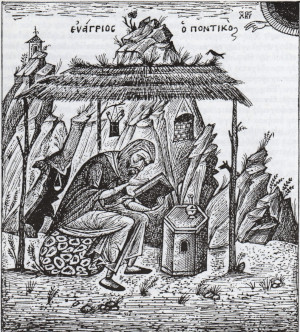
Evagrius the Solitary

Saints from East and West
Saints whose feasts are celebrated this month

October 8 (Byzantine) - Saint Pelagia The Penitent
The Nun Pelagia was converted to Christianity by Sainted Nonnos, Bishop of Edessa (whose commemoration is made on the Saturday of Cheesefare Week). Before her acceptance of saving Baptism, Pelagia was head of a dance troupe in Palestinian Antioch, living life in frivolity and profligacy. But one time Pelagia, elegantly dressed, was making her way past a church, at the doors of which Saint Nonnos was preaching a sermon. Believers turned their faces away from the sinner, but the bishop long glanced after her. Struck by the outer beauty of Pelagia and having foreseen the spiritual greatness in her, the saint in his cell prayed long to the Lord for the sinner, grieving that the poverty attiring his soul could not compare with the splendid garb and beauty of the profligate.
On the following day, when Saint Nonnos was teaching in the church about the Dread Last Judgement and its consequences, Pelagia came. The teaching made such an impression upon her, that betaken with the fear of God and bursting out in tears of repentance, she besought the saint for Baptism. Seeing the sincere and full repentance of Pelagia, Bishop Nonnos baptised her.
By night the devil appeared to Pelagia, urging her to return to her former life. In answer to this the saint made prayer, signed herself with the Sign of the Cross, and the devil vanished. Having gathered up her valuables, Saint Pelagia took them to Bishop Nonnos. The bishop gave orders to distribute it amidst the poor with the words: "Let be wisely dispersed what is miraculously gathered". After this Saint Pelagia in hair-shirt journeyed to Jerusalem to the Mount of Olives. There, until her end (457), she asceticised in seclusion under the masculine-name Pelagios, and attained to great spiritual gifts.

October 20 - Saint John Cantius
Saint John Cantius receives his name from his birthplace, Kanti, near Oswiecim in Poland. His parents were country folk of respectable position and, seeing that their son was as quick and intelligent as he was good, they sent him in due course to the University of Cracow. He took good degrees, was ordained priest, and appointed to a lectureship or chair in the university. He was known to lead a very strict life, and when he was warned to look after his health he replied by pointing out that the fathers of the desert were notably long-lived.
There is a story told that once he was dining in hall, when a famished-looking beggar passed the door. John jumped up and carried out all his commons to the man; when he returned to his seat he found his plate again full-miraculously. This, it is said, was long commemorated in the university by setting aside a special meal for a poor man every day; when dinner was ready the vice-president would cry out in Latin, "A poor man is coming," to which the president replied, "Jesus Christ is coming," and the man was then served.
But while he was yet alive John's success as a preacher and teacher raised up envy against him, and hs rivals managed to get him removed and sent as parish priest to Olkusz. St John turned to his new work with single-hearted energy, but his parishioners did not like him and he himself was afraid of the responsibilities of his position. Nevertheless he persevered for some years, and by the time he was recalled to Cracow had so far won his people's hearts that they accompanied him on part of the road with such grief that he said to them, "This sadness does not please God. If I have done any good for you in all these years, sing a song of joy."
St John's second appointment at the university was as professor of Sacred Scripture, and he held it to the end of his life. He left such a reputation that his doctoral gown was for long used to vest each candidate at the conferring of degrees, but his fame was not at all confined to academic circles. He was a welcome guest at the tables of the nobility (once his shabby cassock caused the servants to refuse him admission, so he went away and changed it. During the meal a dish was upset over the new one. "No matter," he said, "my clothes deserve some dinner because to them I owe the pleasure of being here at all"), and he was known to all the poor in Cracow. His goods and money were always at their disposition, and time and again they literally "cleared him out." But his own needs were few; he slept on the floor, never ate meat, and when he went to Rome he walked all the way and carried his luggage on his back. He was never weary of telling his pupils to "fight all false opinions, but let your weapons be patience, sweetness, and love. Roughness is bad for your own soul and spoils the best cause."
Several miracles were reported of St John, and when news got round the city that he was dying there was an outburst of sorrow. "Never mind about this prison which is decaying," he said to those who were looking after him, "but think of the soul that is going to leave it." He died on Christmas eve, 1473, at the age of eighty-three. St John Cantius was canonized in 1767, and his feast extended to the whole Western church. He is the only confessor not a bishop who has different hymns for Matins, Lauds, and Vespers in the Roman Breviary.


Books to feed your faith!
Man's Contract With God in Baptism
$9.95
How often have we been obliged to witness,in the everyday occurrences of human life, scenes which should call forth tears of blood, in beholding the many persons who, after becoming by Baptism the children of God, the members of Jesus Christ and the living temples of the Holy Ghost, yet live as infidels and pagans than as true Christians. In truth, we do not behold men live, as if neither faith nor reason, made any impression upon them, who, wholly occupied with the world and its vanities, seek nothing beyond the gratifications of their own passions, and who, allowing themselves to be entirely carried away by evil, have no more respect for God than pagans ? If these persons perform any act of religion, it is only in compliance with the family routine, or following the habits acquired in early youth, while they are strangers to the spirit of true piety.- From The Book: Man's Contract With God In Baptism by Saint John Eudes
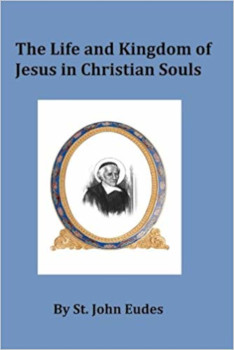
The Life and Kingdom of Jesus in Christian Souls
By St. John Eudes
$16.95
Authored by Saint John Eudes, Introduction by Fulton J Sheen According to the Roman Breviary, Saint John Eudes is the author of devotion to both the Sacred Heart of Jesus and the Immaculate Heart of Mary. His two works on these two devotions are classics. However, he is also a master to the spiritual life; an unknown master. Many are familiar with the works of Saint Bonaventure, Saint Alphonsus Ligouri and Saint Louis de Montfort to name just three of the masters of the spiritual life. And yet, Saint John Eudes has a lot to contribute.

The Life of Dominic Savio
$8.99
As the day of his first Communion drew near, Dominic wrote down four resolutions, remarkably mature thoughts of a seven year old:
I will go to Confession and Communion as often as my confessor will allow.
I will sanctify Sundays and holy days in a special way.
Jesus and Mary will be my friends.
Death, but not sin.

The School of Christian Perfection
$6.50
To be pleasing and acceptable in the sight of God, it is not enough merely to believe all that our holy faith teaches us; we must, moreover, regulate our life in accordance with our belief. Pico of Mirandola says: “It is certainly great folly not to wish to believe the Gospel of Christ; but it would be greater folly still to believe it and to live as if you did not believe it.”
For More Good Traditional Catholic Books:
Brother Hermenegild's Spiritual Bookshelf
Pope Michael's Books
Christ the King Library


October recipes!
Pumpkin Gingerbread
Prep: 15 minutes
Cook: 45 minutes
Ready In: 1 hour
"Wonderfully flavorful and fragrant bread for the holidays."
Ingredients
3 cups sugar
1 cup vegetable oil
4 eggs
2/3 cup water
1 (15 ounce) can pumpkin puree
2 teaspoons ground ginger
1 teaspoon ground allspice
1 teaspoon ground cinnamon
1 teaspoon ground cloves
3 1/2 cups all-purpose flour
2 teaspoons baking soda
1 1/2 teaspoons salt
1/2 teaspoon baking powder
Directions
Preheat oven to 350 degrees F (175 degrees C). Lightly grease two 9x5 inch loaf pans.
In a large mixing, combine sugar, oil and eggs; beat until smooth. Add water and beat until well blended. Stir in pumpkin, ginger, allspice cinnamon, and clove.
In medium bowl, combine flour, soda, salt, and baking powder. Add dry ingredients to pumpkin mixture and blend just until all ingredients are mixed. Divide batter between prepared pans.
Bake in preheated oven until toothpick comes out clean, about 1 hour.
Apple Butter Pork Loin
Prep: 15 minutes
Cook: 3 hours
Ready In: 3 hours 15 minutes
"This pork is seasoned with a spiced apple butter, and roasted in apple juice. If food can be warm and cozy, this is it - a great Sunday dish!"
Ingredients
2 (2 pound) boneless pork loin roast
seasoning salt to taste
2 cups apple juice
1/2 cup apple butter
1/4 cup brown sugar
2 tablespoons water
1/4 teaspoon ground cinnamon
1/4 teaspoon ground cloves
Directions
Preheat the oven to 350 degrees F (175 degrees C).
Season the pork loins with seasoning salt, and place them in a 9x13 inch baking dish or small roasting pan. Pour apple juice over the pork, and cover the dish with a lid or aluminum foil.
Bake for 1 hour in the preheated oven. While the pork is roasting, mix together the apple butter, brown sugar, water, cinnamon, and cloves. Remove pork roasts from the oven, and spread with apple butter mixture.
Cover, and return to the oven for 2 hours, or until fork-tender.

Video sermons and instructions: Both brand new and from years past!
Christ the King 2010
19th Sunday after Pentecost 2011
18th Sunday after Pentecost 2013
To God Be The Glory
Lamp & Light Bible Study - Matthew 12


VIE CATHOLIC RADIO EVENTS FOR OCTOBER
The month of the Holy Rosary is October and this entire month is dedicated to the Rosary. The feast day of the Holy Rosary in particular is October 7th. The feast of the Rosary is held on October 7th in memory of the glorious and triumphant victory at the battle of Lepanto. That battle was the most convincing military victory that proved without a doubt the great power of the Rosary.
The month of October is a good time to commit to praying the Rosary everyday. We believe that the Rosary can bring great peace and holiness to your life. It can be a powerful instrument for conversion, it is one way that helps to protect the Church from false teachings, keeps her safe from the attacks from the enemy, and is a wonderful way that you can show honor to Mary.
Every day you can pray the Rosary along with us at the VIE Catholic Radio Network at 6am/12am/6pm/12pm. Also this month we have a Holy Rosary Sermon!
Sundays at 5am/11am/5pm/11pm
Weekdays at Tues, Thurs, and Sat. 5am/11am/5pm/11pm
And if you would like go over to the Vatican In Exile Download page and print out our rosary pamphlet and hand them out to people whether it be your catechism class, neighbors or friends.
We have people from all over the world that tune in to the VIE Catholic Radio network! Over the last month our numbers continued to improve! We were up 4% in Unique Listeners, and 35% on how many times they tuned in. Our numbers fell off slightly in the amount of time that our listeners spent listening online, due most likely to the power and internet outages effected by the hurricanes and storms the eastern U.S. faced over the last month. Please keep our listeners and benefactors who have been affected by the storms in your prayers!
And though we have continued to grow each and every month, very few contact us to tell us what they think. We love to hear from our listeners! So we encourage you to please email us or write us with your thoughts and let us get to know you. For everyone that contacts us we will send a free copy of the Gospel of John, a rosary and a rosary pamphlet. It will be our gift to you, thanking you for taking the time to contact us. But please give us your mailing address so that we can send them out to you. To get OUR address, or to contact us by email please go to the contact page at www.VIECatholicRadio.com . And Lastly, these programs are provided for you free of charge but it does cost us money to get them out to you. We sure would appreciate any financial help that the Lord would lay on your heart to give. We have a small group of people who faithfully send us a gift to help us with the up keep of this station. And we are so grateful for what they give. And of course we all ways need your prayers. Thanks for taking the time to tune in and listen. We pray that our programs will continue to be a blessing to you and your family.


“O Lord, how great are thy works! thy thoughts are exceeding deep.
The senseless man shall not know: nor will the fool understand these things.”
Psalm 91:6-7.
Researchers in the 1950s and ’60s established that the octopus is quite intelligent and can learn different visual patterns. Octopi have very large brains with large areas reserved for storing information. New research has shown that they are even more intelligent than earlier studies revealed. These findings run counter to evolutionary theory, which says that intelligence evolves in social species to help them deal with social relationships. The octopus is not a social animal and operates alone.
Unlike other animals, octopi use a variety of strategies to solve the same problem. They can use their eight powerful arms to open clams, or they can drill through the shell and inject a fast-acting poison. In the laboratory, octopi kept in isolation were given a floating plastic bottle. The bored octopuses quickly devised a variety of games to play with the bottle – a sure sign of intelligence.
The Creator gave the octopus the ability to learn a lot so it could cope with its unusual way of life. Octopi begin life as tiny plankton that drift with the ocean currents. When they finally settle to the bottom, they may find themselves in any of the many habitats provided by the ocean and face any variety of predators and food sources. Thus, their Creator designed them with the ability to learn how to adapt to a large variety of habitats and situations.
Prayer: Lord, help me to faithfully use the intelligence You have given me. Amen.

Catechism Catch-Up
A Description of the Church; The Bride of Christ

God planned marriage to be a picture of the relationship of Christ and the church.
"Many names, moreover, which are replete with mysteries, have been used to designate the Christian body. Thus, by the Apostle,......it is called the spouse of Christ."-Catechism of the Council of Trent.
Let women be subject to their husbands, as to the Lord: Because the husband is the head of the wife, as Christ is the head of the church. He is the saviour of his body. Ephesians 5:22-23
The church is betrothed, espoused and promised as the intended bride of her husband, Jesus Christ. The marriage is not consummated. That is yet to come when he returns for us.
For I am jealous of you with the jealousy of God. For I have espoused you to one husband that I may present you as a chaste virgin to Christ. (2 Corinthians 11:2)
What does it mean when St. Paul says that the church is espoused or betrothed to Jesus?
MODERN DAY ENGAGEMENT VS. A JEWISH BETROTHAL.
It is important for us to understand the difference between an engagement and a Jewish betrothal. We would tend to think that they are the same. In fact, they are described as the same in my dictionary, but there is a vast difference between the two. A betrothal (in the past) was the legal side of the marriage for Jewish people; it is, in fact, a covenant. The Jewish people call it kiddushin (betrothal).
There is no set way to do this, but quite commonly it was done by the payment of a bride price in the presence of two witnesses, and reciting the marriage formula, "Thou art consecrated to me according to the law of Moses and of Israel." She is not required to respond; her silence is her acceptance. This reserved the young woman for him until the day of the wedding ceremony after which the marriage would be consummated by the two becoming one flesh (having intercourse). It doesn't matter what you call it, betrothal or engagement, the important thing to know is if there are vows involved or not. They know that this is done when they are betrothed, and we know this is done at the altar. This is very clear in our minds that the wedding day is the day of no turning back. Just as it is clear in the mind of the Jewish people when they are betrothed according to their customs.
Although of course, some of them break these vows just as some of us. Nevertheless a traditional Jewish betrothal is taken very seriously because this is their vow. So an engagement may be called off at any time, and for any reason because no vows are made, but rather they agree to make those vows at a later date. Whereas a betrothal is a Jewish person's vows, and therefore binding until death do they part.
This is why sometimes in the Bible a wife can be called a wife before she is actually married, a man may also be called a husband in the same situation, father-in-law, son-in-law, etc. The Bible may also say married when actually betrothed. Also, it may say adultery instead of fornication. But adultery cannot be called fornication. Because one takes a vow when they are betrothed it is understandable how one can be considered married. If the person fornicates it could be called adultery. Of course s-x before marriage is fornication, not adultery, but God's word, customs, and ways of speaking do not always follow the rules. We all know a whale is a mammal, not a fish; yet Jonah's whale is called a fish. There are lots of funny things that don't go by our proper English rules. All we can do is accept that fact and try to reach for the meaning of the Word. So it is understandable for fornication to be called adultery, but to go the other way and call adultery fornication doesn't make sense. Because to call fornication adultery, is showing the strength and importance of a covenant by exaggeration. But to call adultery fornication lessens the strength and importance of the covenant. Once one has made a covenant and consummated it, to lessen the value of an extra marital affair and broken vows from adultery to fornication would be a little odd. We exaggerate things to prove a point, but it doesn't make sense to make a point by lessening the value of something, at least not in the case when you would try to prove the strength and not the weakness of something. So adultery may be fornication, but fornication cannot be adultery. 1
5 Characteristics of the Bride of Christ
A Worker at Home:
The Bride (The Church) maintains, rules, and guides the Home (the Family of God) It is not her main job to provide for them. That is the Husband's (Christ) responsibility.
She hath sought wool and flax, and hath wrought by the counsel of her hands. And she hath risen in the night, and given a prey to her household, and victuals to her maidens. She hath considered a field, and bought it: with the fruit of her hands she hath planted a vineyard. She hath tasted and seen that her traffic is good: her lamp shall not be put out in the night. She hath put out her hand to strong things, and her fingers have taken hold of the spindle. She shall not fear for her house in the cold of snow: for all her domestics are clothed with double garments. She hath made for herself clothing of tapestry: fine linen, and purple is her covering. She made fine linen, and sold it, and delivered a girdle to the Chanaanite. She hath looked well to the paths of her house, and hath not eaten her bread idle. Proverbs 31:13 15-16, 18-19, 21-22, 24, 27
I will therefore that the younger should marry, bear children, be mistresses of families (Or rule and Guide the Home) I Timothy 5:14
The aged women, in like manner, in holy attire, not false accusers, not given to much wine, teaching well: That they may teach the young women to be wise, to love their husbands, to love their children, To be discreet, chaste, sober, having a care of the house, gentle, obedient to their husbands, that the word of God be not blasphemed. Titus 2:3-5
The Bride of Christ should care for its children by providing sustenance through the body and blood which her Husband, Christ, has provided for her.
The Bride of Christ cares for its children through the sacraments of Baptism, Confirmation, Confession etc. The Bride of Christ maintains discipline in the "Home" by teaching, warning, and training up the children.
God's intention for the Bride of Christ is to find her fulfillment in maintaining the "home" and children and by keeping the "house", loving the children and making the "home" a haven for her family.
Is the Bride of Christ today fulfilling her responsibilities as she should? Or is she allowing chaos, division, and confusion reign in the "home"?
It is The Bride of Christ duty to be a help or "help meet" to her Husband
And the Lord God said: It is not good for man to be alone: let us make him a help like unto himself. Genesis 2:18
Ezer which is commonly translated as "help" is really a rich word with a much deeper meaning.
Diana Webb in her book Forgotten Women of God clarifies "help" by explaining,
"The noun ezer occurs 21 times in the Hebrew Bible. In eight of these instances the word means “savior”. These examples are easy to identify because they are associated with other expressions of deliverance or saving. Elsewhere in the Bible, the root ezer means “strength.... the word is most frequently used to describe how God is an ezer to man."
For example the word "ebenezer" in 1 Samuel 7:12 is used to describe the power of God's deliverance. "Eben" means rock and "ezer" means "help" or "salvation". Ebenezer therefore means "rock of help" or "rock of salvation". The root "ezer" is the same word that God used to describe to Adam who Eve was. She was not intended to be just his helper, rather she was intended to be a savior.
The other part of the term "help like unto" which is commonly translated as "meet for" or "fit for" is the word "k’enegdo". It is hard to know exactly what the word k’enegdo means because it only appears once in the entire Bible. Yet Diana Webb explained that,
"Neged, a related word which means “against”, was one of the first words I learned in Hebrew. I thought it was very strange that God would create a companion for Adam that was “against” him! Later, I learned that kenegdo could also mean “in front of” or “opposite.” This still didn’t help much. Finally I heard it explained as being “exactly corresponding to,” like when you look at yourself in a mirror."
Eve was not designed to be exactly like Adam. She was designed to be his mirror opposite, possessing the other half of the qualities, responsibilities, and attributes which he lacked.
What does this all mean for the Bride of Christ? The Bride of Christ, in a nutshell, is to "help", ezer, her Husband in the saving of the Church. She fullfills what is lacking in the her Husband's part in Salvation. She completes His work on the cross.
St. Paul said this, "Who now rejoice in my sufferings for you, and fill up those things that are wanting [or lacking] of the sufferings of Christ, in my flesh, for his body, which is the church:"Colossians 1:24
The Apostle Paul in his suffering and preaching continues the reconciling work of Christ. ( Origen, Chrysostom, Theodore, Severian, Theodoret, Ambrosiaster.) Paul represents all Christians, and ultimately the church itself, as a corporate continuation of the reconciling work of Christ (Augustine).
The Bride of Christ Should Love her Husband and her Children
That they may teach the young women to be wise, to love their husbands, to love their children.Titus 2:4
Whosoever believeth that Jesus is the Christ, is born of God. And every one that loveth him who begot, loveth him also who is born of him. I John 5:1
How should the Bride love?
And if I should distribute all my goods to feed the poor, and if I should deliver my body to be burned, and have not charity, it profiteth me nothing. Charity is patient, is kind: charity envieth not, dealeth not perversely; is not puffed up; Is not ambitious, seeketh not her own, is not provoked to anger, thinketh no evil; Rejoiceth not in iniquity, but rejoiceth with the truth; Beareth all things, believeth all things, hopeth all things, endureth all things. Charity never falleth away:I Corinthian 13:3-4
Love is Patient:
Patience is a fruit of the Holy Ghost (Galatians 5:22).
Impatience is a fruit of selfishness. And selfish is simply an ugly, accurate description of my fallen, depraved nature, which wants all of creation to serve me. Selfishness is the real archenemy of love. Love is patient because patience is a dying to selfishness. It is the belief that in this dying we will find greater joy in the joy of the ones we are seeking to love: God and His children.
The Church should be patient with those who are struggling to do the right thing. Don't expect people to "turn over a new leaf" right off the bat!
Love is Kind:
The Greek word rendered “kind” in this verse literally means to “show oneself useful” in the sense of manners or morals. The first concept is related to the idea that to be kind means to be useful or helpful. In this sense, kindness is not merely an attitude or state of being. It is also a deed. The connotation is that kindness is to be obliging and accommodating. Love, in this context, creates no trouble or disturbance but, rather, desires to promote happiness by extending good to others. It is a good-naturedness that not only wishes well but also does well. Kindness is benevolence in action. The second concept that is implicit in kindness deals with being courteous, polite, compassionate, and affectionate. It refers to conduct that is gentle, mild, tender, and pleasant, especially under provocation. It is the opposite of acting bitter, sharp, disagreeable, and harsh.
The Church should itself be useful in the community as well as conducting itself in gentleness, mildness. that does not mean that we should allow every sin in the book to go on in the Church. But we should handle it with compassion and affection.
Love does not Envy:
When God tells us that love does not envy, He means we need to be happy for who and what we are. We are not to be comparing ourselves with others, nor are we to be jealous, spiteful, or possessive of others, because God is the One in control, and He has a unique plan for you and me.
Our little Parish may not be as nice or as big as the one down the road. But if God is in control we can know that he has a unique plan for our little Parish just as he has a unique plan for the big one.
Love dealeth not perversely: ST. GREGORY, in his explanation of these words, "dealeth not perversely," says that charity/love, giving herself up more and more to the love of God, ignores whatever is not right and holy. [Mor. 1. 10, c. 8.]
The Church, will not allow the things of this world to destroy what is holy. The Church, will not allow things that are sinful to come into the life of the family of God.
Love is is not puffed up:
To be puffed up is to have an inflated opinion of oneself. But pride cannot coexist with godly love. Christian love is not proud or focused on self. Did you ever see a balloon that was not blown up? How big was it? It was pretty small-and hardly noticeable. But if you blow it up, what happens to the balloon? It gets much bigger-maybe ten or twenty times bigger-and is much more noticeable. That's what it means to be puffed up. It means you want people to notice you; it means showing off.
The Bride of Christ, when there is a scandal, does not try to hide it because of trying to save face. They deal with it for the sake of the children and Christ there husband.
Love is not ambitious:
Ambitious means "having or showing a strong desire and determination to succeed."
The Bride of Christ's goal is not in succeeding as it is to fulfill the will of Christ there Husband. No matter the results or the consequences.
Love seeketh not her own:
Sin is, at its core, selfishness. We fail to conform to God’s design for us and miss out on His blessings because we are too busy with our own interests.
The Bride of Christ only seeks what her Husband Christ seeks. It has no agenda other then doing the will of their Husband.
Love is not provoked to anger: The Bride of Christ is not to be touchy, easily provoked, fretful, resentful, suspicious, or oversensitive with her feelings. She is to be very slow to get angry, and she is not to let little things cause her to "fly off the handle."
Love thinketh no evil:
To thinketh no evil is to not form unjust opinions of others. It is not however implied that the Bride of Christ is blind to facts, or that she is incapable of thinking of things as they are. She is simple-hearted and unsuspicious.
j) Love rejoiceth not in iniquity, but rejoiceth with the truth:
St. Alphonso says, "Charity, (agape love) and truth always go together." he goes on to say that, "God wishes us to love him with our whole heart: Thou shalt love the Lord thy God with thy whole heart, and with thy whole soul, and with thy whole strength. (Deuteronomy 6:5) that person loves Jesus Christ (who is Truth) with his whole heart who says to him with the Apostles; Lord, what wilt Thou have me to do?"
The Bride of Christ does not rejoice IN the midst of sin that is found amongst her. But she does rejoice WITH the truth. Jesus Christ is the truth and she desires to fully surrender to His will. To walk in the path of righteousness, beside Him, WITH Him, doing His will, for His name sake.
k) Love beareth all things: The word “beareth” in 1 Corinthians 13:7 is the Greek word “stego”.
To understand how it is being used. You can go to these other verses and see the Greek word "stego" being translated as the word Roof. (Matthew 8:8, Mark 2:4, Luke 7:6). Agape Love is like a roof. Love covers. One standard lexicon defines this word like this: “love bears” means “to cover” or “to pass over in silence” or, here it is, “to keep confidential.” Love bears all things: it keeps things confidential.
That's what the Bride of Christ through the Priest does in the confessional:
"The Confessor Must Observe the Seal of Confession : Since each one is most anxious that his sins and defilements should be buried in oblivion, the faithful are to be admonished that there is no reason whatever to apprehend that what is made known in confession will ever be revealed by the priest to anyone, or that by it the penitent can at any time be brought into danger of any sort. The laws of the Church threaten the severest penalties against any priests who would fail to observe a perpetual and religious silence concerning all the sins confessed to them. Let the priest, says the great Council of Lateran, take special care, neither by word or sign, nor by any other means whatever, to betray in the least degree the sinner." -Catechism of the Council of Trent
l) Love believeth all things:
"Believeth" comes from the greek word, "pisteu". Which means, "to think to be true, to be persuaded of, to credit, place confidence in, to trust" It means that the Bride of Christ is to have confidence in the Groom, Jesus Christ. They are to trust Him and to always give Him the benefit of the doubt, believing the best of Him. It is a relationship that is not filled with suspicion, but complete trust. We should always have in our heart and on our lips the words, "Jesus I trust in You."
m) Love hopeth all things:
Referring to the death of Joseph in the Old Testament....
And he died being a hundred and ten years old. And being embalmed he was laid in a coffin in Egypt. (Genesis 50:25)
The word "coffin" here comes from the Hebrew word 'arown, which has been translated as coffin, chest, and ark, (as in the ark of the covenant).
The President of my College told this story one time:
"How well do I recall the day my sister came home and announced her engagement. I remember that she got out the old family cedar chest and made a hope chest out of it. It had been just an old storage chest, a combination sofa and cabinet, but now that old chest took on new life. It became a hope chest. Week after week she placed things in the hope chest looking forward to the day of the marriage. Finally, the day before the wedding she opened it and took out what she had placed in it. The old cedar chest was a hope chest and the wedding day had come."
To the Bride of Christ, which we as Catholics are all a part of, a coffin is not a coffin but a "hope chest." That hope began the day the Church was established and the old drab looking casket is now a hope chest. Day by day we are putting things in that hope chest as we serve the Lord and lay up treasures in Heaven. One day perhaps we shall be buried in what the world calls a coffin, but for those of us who truly are a part of the Bride of Christ it will be a hope chest. Thank God, on the "wedding day," the hope chest will be opened, and what was placed in it will come out.
Looking for the blessed hope and coming of the glory of the great God and our Saviour Jesus Christ, Who gave himself for us, that he might redeem us from all iniquity, and might cleanse to himself a people acceptable, a pursuer of good works. (Titus 2:13)
Let us be glad and rejoice, and give glory to him; for the marriage of the Lamb is come, and his wife hath prepared herself. And it is granted to her that she should clothe herself with fine linen, glittering and white. For the fine linen are the justifications of saints. (Apocalypse/Revelation 19:7-8)
n) Love endureth all things:
There are things coming from the outside that would try to keep the Bride of Christ from enduring, or to bear under circumstances. Thats why when a man and a women gets married they say, "For better, for worse. For richer, for poorer. In sickness, and in health."
The Church has proven this in countries where there has been much persecution. It is those places where the Church, the Bride of Christ, has grown the most and the strongest.
For what glory is it, if committing sin, and being buffeted for it, you endure? But if doing well you suffer patiently; this is thankworthy before God. (I Peter 2:20)
4. The bride of Christ should have fear toward Christ her husband
Nevertheless let every one of you in particular love his wife as himself: and let the wife fear her husband. (Ephesians 5:33)
In what way does the Bride of Christ fear her Husband Jesus?
"In good men, the fear of God is a holy awe or reverence of God and his laws, which springs from a just view and real love of the divine character, leading the subjects of it to hate and shun every thing that can offend such a holy being, and inclining them to aim at perfect obedience. This is filial fear."- 1828 Noah Webster's American Dictionary of the English Language.
Chrysostum, concerning Ephesians 5:33, says, "How, one may say, is there to be love when there is respect? Love is most powerfully present when accompanied by respect. For what she loves she also reveres, and what she reveres, she also loves. She reveres him as the head and loves him as a member of the whole body.
If the Bride of Christ needs wisdom in how to run the Church a fear, a reverence for her Husband Christ is needed.
The fear of the Lord is the beginning of wisdom. A good understanding to all that do it. Psalms 110:10 DRB/ Psalms 111:10
Therefore fear the Lord, and serve him in truth and with your whole heart, for you have seen the great works which he hath done among you. I Kings DRB/1 Samuel 12:24
5. The Bride of Christ should be in Submission to her Husband Christ
"Wives, submit yourselves unto your own husbands, as unto the Lord. For the husband is the head of the wife, even as Christ is the head of the church: and he is the saviour of the body. Therefore as the church is subject unto Christ, so let the wives be to their own husbands in everything. Husbands, love your wives, even as Christ also loved the church, and gave himself for it. . . . This is a great mystery: but I speak concerning Christ and the church" (Ephesians 5:22-25, 32).
The Church then, according to St. Paul, is ever obedient to Christ, and can never fall from him, but remain faithful to him, unspotted and unchanged to the end of the world.-Douay Rheims Commentary
The union of Christ and His bride the church is holy. Just as a congregation of heretics, however, cannot rightly be called the church of Christ and cannot have Christ as its head, so cannot be truly called holy if there is a disregard for the way of life taught by Christ-Jerome
6.The Bride of Christ will be intimate with Christ her Husband.
God had a complaint about the church in Ephesus and it was this: But I have somewhat against thee, because thou hast left thy first charity (Thy first love). (Apocalypse/Revelation 2:4)
The church in Ephesus was busy doing many things for God, yet Jesus said, But I have somewhat against thee, because thou hast left thy first charity (Thy first love).
The Lord commanded them, “Be mindful therefore from whence thou art fallen: and do penance, and do the first works.” (Apocalypse/Revelation 2:5).
Below I would like to suggest some "first works" that were given to me at one time to help me to get back to that first charity, that first love, that intimacy all of us as a part of the Bride of Christ should have with Him.
A. You delight in someone else more than you delight in the Lord.
Your love for God should be foremost in your heart, exceeding the bond of any other relationship. Jesus identified the greatest of all commandments: “And thou shalt love the Lord thy God, with thy whole heart, and with thy whole soul, and with thy whole mind, and with thy whole strength.” (Mark 12:30).
B. Your soul does not long for times of rich fellowship with God in times of meditating on Him through reading Scripture, Pious books and prayer.
“Thou shalt love the Lord thy God with thy whole. . . soul . . .” (Mark 12:30). When your mind, will, and emotions wander from devotion to God, watch out.
Your relationship with God deepens as you spend time with him and commune with Him in prayer. If you forsake this fellowship, your understanding of your true condition before God will grow dull. As God’s children, His friends, and His bride (see Matthew 5:44–45, James 2:23, John 15:15, and Apocalypse/Revelation 21:9), it is critical that we draw near to Him to engage in our relationship with Him. (See James 4:7–8.)
C. Your thoughts in leisure moments do not honor the Lord.
“Thou shalt love the Lord thy God with thy whole. . . mind . . .” (Mark 12:30). The things that captivate your thoughts in leisure moments reveal much about the priorities of your heart. The Apostle Paul instructed us, “whatsoever things are true, whatsoever modest, whatsoever just, whatsoever holy, whatsoever lovely, whatsoever of good fame, if there be any virtue, if any praise of discipline, think on these things.” (Philippians 4:8).
D. You make excuses for doing things that displease the Lord, claiming to be “only human.”
“Thou shalt love the Lord thy God with thy whole . . . strength” (Mark 12:30). God wants you to dedicate your life to Him as a “living sacrifice” (see Romans 12:1–2), discerning His will in all things and walking in obedience to Him. As your Good Shepherd, He will lead you “He hath led me on the paths of justice, for his own name' s sake.” (Psalm 22:33 DRB, 23:3).
There is no excuse for disobeying the Lord. His grace is sufficient to rescue you from every temptation. (See I Corinthians 10:13.) The truth is, “But every man is tempted by his own concupiscence, being drawn away and allured. Then when concupiscence hath conceived, it bringeth forth sin. But sin, when it is completed, begetteth death. Do not err, therefore, my dearest brethren.” (James 1:14–16).
Your obedience to God demonstrates your love for Him. Jesus said, “If you love me, keep my commandments.” (John 14:15). “If you love me, keep my commandments.” (John 15:10).
E. You do not willingly and cheerfully give to God’s work or to the needs of others.
Generosity is part of God’s holy character: “For God so loved the world, as to give. . .” (John 3:16), and He “loveth a cheerful giver” (II Corinthians 9:7). Therefore, “He that hath the substance of this world, and shall see his brother in need, and shall shut up his bowels from him: how doth the charity of God abide in him? ” (I John 3:17).
As believers, we are to love and give—even to our enemies. (See Luke 6:27–36, Romans 12:20, and Matthew 5:42.) We can do this only by the grace of God, as He renews our minds and teaches us to walk in obedience to His voice.
F. You cease to treat others as you would treat the Lord.
Jesus said, “A new commandment I give unto you: That you love one another, as I have loved you, that you also love one another.” (John 13:34). “Love one another” is not a suggestion; it is a command that we are enabled to fulfill by the work of the Holy Spirit in our lives.
Do you find that you are quick to judge and condemn others? Consider God’s love for you and His command that you love others with His love. “In this is charity: not as though we had loved God, but because he hath first loved us, and sent his Son to be a propitiation for our sins. My dearest, if God hath so loved us; we also ought to love one another.” (I John 4:10–11).
G. You view Christ's commands as restrictions to your happiness rather than expressions of His love.
God’s commandments, the words of your wise and caring Father, lead you toward what is good and away from what is evil. “He that hath my commandments, and keepeth them; he it is that loveth me. And he that loveth me, shall be loved of my Father: and I will love him, and will manifest myself to him.” (John 14:21). Obedience to His commandments brings true freedom and joy. (See John 8:31–32, 36.)
H. You strive for affirmation from the world rather than approval from the Lord.
Jesus faced misunderstandings and rejection because of His obedience to God, and you will face similar situations. “If you had been of the world, the world would love its own: but because you are not of the world, but I have chosen you out of the world, therefore the world hateth you.” (John 15:19).
“Love not the world, nor the things which are in the world. If any man love the world, the charity of the Father is not in him. For all that is in the world, is the concupiscence of the flesh, and the concupiscence of the eyes, and the pride of life, which is not of the Father, but is of the world. And the world passeth away, and the concupiscence thereof: but he that doth the will of God, abideth for ever.” (I John 2:15–17).
I. You fail to make Christ or His words known because you fear rejection.
If your faithfulness to God depends on the reaction of those around you, you are serving men instead of serving God. (See Galatians 1:10.) Jesus’ obedience to God aggravated many people, including the religious leaders of his community. “Remember my word that I said to you: The servant is not greater than his master. If they have persecuted me, they will also persecute you: if they have kept my word, they will keep yours also.” (John 15:20).
Be faithful to proclaim the truth in love, because God “hath said: I will not leave thee, neither will I forsake thee. So that we may confidently say: The Lord is my helper: I will not fear what man shall do to me.” (Hebrews 13:5–6).
J. You refuse to give up an activity that you know is offending a weaker brother.
In every generation, Christians seek God’s will concerning discretionary activities. “Therefore every one of us shall render account to God for himself. Let us not therefore judge one another any more. But judge this rather, that you put not a stumbling block or a scandal in your brother's way. I know, and am confident in the Lord Jesus, that nothing is unclean of itself; but to him that esteemeth any thing to be unclean, to him it is unclean. For if, because of thy meat, thy brother be grieved, thou walkest not now according to charity. Destroy not him with thy meat, for whom Christ died.” (Romans 14:12–15). (See also Romans 12:10 and Philippians 2:3–8.)
K. You become complacent toward sinful conditions around you.
Jesus warned that “And because iniquity hath abounded, the charity of many shall grow cold.” (Matthew 24:12). Witnessing the sinfulness of the world around you should motivate you to follow after God with even greater determination. “Be sober and watch: because your adversary the devil, as a roaring lion, goeth about seeking whom he may devour. Whom resist ye, strong in faith: knowing that the same affliction befalls your brethren who are in the world.” (I Peter 5:8–9).
L. You are unwilling to forgive your offenders.
“ If any man say, I love God, and hateth his brother; he is a liar...." (I John 4:20). Holding a grudge against another person indicates that you have lost sight of the greatness of God’s forgiveness of your sin and your need for His grace. (See Matthew 18:21–35.)
Bitterness is the natural fruit of unforgiveness. As believers, we are to “Follow peace with all men, and holiness: without which no man shall see God. Looking diligently, lest any man be wanting to the grace of God; lest any root of bitterness springing up do hinder, and by it many be defiled.” (Hebrews 12:14–15). A spirit of forgiveness is essential to the Christian. Jesus said, “But if you will not forgive, neither will your Father that is in heaven, forgive you your sins.” (Mark 11:26).
A prayer of ancient Israel’s leader, Moses, gives us insight into the goal of keeping our first love: “If therefore I have found favour in thy sight, shew me thy face, that I may know thee, and may find grace before thy eyes:” (Exodus 33:13).The longing of our hearts should be to know God, to know Him intimately. That is the reason for knowing His ways and His will: to know Him. And this is God’s promise to His children: “You shall seek me, and shall find me: when you shall seek me with all your heart. And I will be found by you....” (Jeremiah 29:13, 14a).
If your love for God has grown cold, take steps to renew your relationship with Him. Return to your first love. (2)
In conclusion there can only be one Bride, one Church. Those outside the Catholic Church are not part of the Bride of Christ.
Christianity, like marriage is exclusive in its bonds. There is only one church that Christ loves not two. - Cyprian
(2) Institute in basic life Principles

Living Catholic:
The Poverty of the Prosperity Gospel
The Book of Job has both shaken me and shaped me.
When I first read it, I found it troubling. It didn’t seem fair. Job was a righteous man. But over the years, this story has helped forge my understanding of God and my theology of suffering. It has taught me that God himself — not anything he gives me — is my greatest treasure.
Years ago, a colleague mentioned what he had learned from Job. I was surprised to hear that his study had yielded a markedly different conclusion than mine. In his words, “Job got everything back and more for his suffering. He was blessed with more children and more money than he ever had before. That’s what the story shows us — doing the right thing always brings blessing and prosperity.”
While the first part was true, I disagreed with his conclusion. He subtly was echoing the message of the so-called “health, wealth, and prosperity gospel” — that God’s goal for us in this life is perfect health, total happiness, and financial gain. In this life. “We simply need to name what we want,” it says, “live the right way, and then claim our victory. That is what living for God looks like.”
I contend that this approach is not living for God. Such thinking is idolatry. It is elevating God’s gifts above him, the giver. And that is a great assault on God’s value.
The Truly Abundant Life
Proponents of the prosperity gospel see things differently. They believe their position is biblical, citing Scripture to back up their claims. One such verse is (John 10:10) “I am come that they may have life, and may have it more abundantly.”
Jesus does give us abundant life, but his abundant life is independent of circumstances.
A diagnosis of cancer, a stock-market crash, and a child’s rebellion cannot diminish the abundant life we have in Christ. And a miraculous healing, a financial windfall, and a prodigal’s return don’t transform it either. True abundant life rests in the God who is Lord over the good things and the terrible things in our life. As Job says, “If we have received good things at the hand of God, why should we not receive evil? ” (Job 2:10)
When we assert that pain-free lives are God’s reward for the righteous, we insinuate to the wounded that their problems are of their own making. As Randy Alcorn says,
“Tragically, the prosperity gospel has poisoned the church and undermined our ability to deal with evil and suffering. Some in the Church today have no place for pain. Those who say God has healed them get the microphone, while those who continue to suffer are shamed into silence or ushered out the back door.”
Many disabled people have experienced similar treatment under the assumption that if you’re not healed, it’s your fault. “Because God’s will is for everyone to be healed. Always. The faithful will never suffer.”
This belief is contrary to Church teaching and to scripture. Jesus says we will have tribulation. “In the world you shall have distress” (John 16:33). Peter says we shouldn’t be surprised by suffering. “think not strange the burning heat which is to try you, as if some new thing happened to you;” (1 Peter 4:12). James says to expect temptations, and to count it all joy “count it all joy, when you shall fall into divers temptations;”(James 1:2). And Paul says afflictions bring endurance and glory “And not only so; but we glory also in tribulations, knowing that tribulation worketh patience; And patience trial; and trial hope; And hope confoundeth not: because the charity of God is poured forth in our hearts, by the Holy Ghost, who is given to us.”(Romans 5:3–5). “For that which is at present momentary and light of our tribulation, worketh for us above measure exceedingly an eternal weight of glory.” (2 Corinthians 4:17).
Of course, healing in this life can bring God glory as well. Sometimes God intervenes in our lives in supernatural ways and miraculously heals them from disease. And God is glorified when that happens.
But I have seen God even more glorified when people are not healed yet continue to praise him in the midst of deep suffering — when everything they have is stripped away and all that is left is God alone. And he is found sufficient.
God is most glorified when we declare him sufficient in the midst of great loss. Just as Job did.
Giver More Than Gifts
The prosperity gospel teaches that we live for God’s material blessing now. Job teaches that we live for God’s eternal glory. At the heart of the prosperity gospel is our value. At the heart of Job, and all of Scripture, is God’s value.
Satan is a proponent of the prosperity gospel, as he tells God that Job’s faithfulness is predicated on God’s blessings. And if those blessings are taken away, he believes Job will curse God to his face. Satan is implying that God is valuable only for what he gives Job.
But God contends just the opposite. God asserts that Job loves him for who he is, not for what he gives.
And when Job is able to say, after losing everything, “The Lord gave, and the Lord hath taken away: as it hath pleased the Lord so is it done: blessed be the name of the Lord. ” (Job 1:21), he declares the surpassing worth of God. God himself, not his gifts, is Job’s true treasure.
As the Psalmist declares:
For thee my flesh and my heart hath fainted away: thou art the God of my heart, and the God that is my portion for ever.
(Psalms 72:25-26)May we all, like Job, find our treasure in God, who is our portion forever.
This is an article by Vaneetha Rendall Risner a freelance writer and a regular contributor to Desiring God.
The article was adapted for a Catholic perspective.
Tonsure and Ordination - September 2018
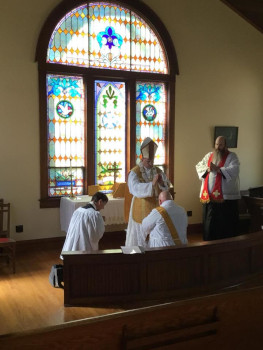


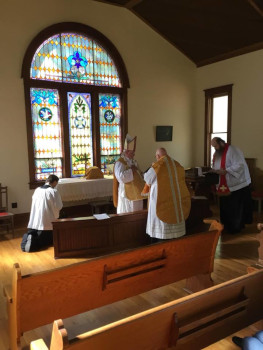


Pray for the Holy Father! Pray with the Holy Father!
- Your prayers are asked this month and every month for the intentions of the Holy Father, Pope Michael.
- Be sure to keep the new foundation of St. Helen Catholic Mission in your prayers. Why not go on over to the site now and see what they have to offer and how you might be able to help!
- Your prayers are asked for the newly-ordained Father Francis Dominic as he embarks upon the important work entrusted to him within the Church.
- Please pray for Brother Stephen as he embarks upon his studies and preparation for the Diaconate.
- Please pray for Brother Stephen's wife, who is in hospital. May God grant the swift grace of His healing!
- Pray for those outside the Church and those who do not know God, that they may see the light of grace and be led safely home to the refuge of the Holy Catholic Church.
- As always, we also ask that you pray for yourself! Never forget your own state of soul. God is calling you to His service in His love. We know that our Lord can count on you to answer.
- We are all praying especially for you, too. May you correspond with every grace of God!
- In what other needs or intentions may we pray for you? Let us know!



To Donate by Mail:
Our address is
Vatican in Exile
829 NE Chester
Topeka, Kansas 66616
Make Checks payable to:
Vatican in Exile


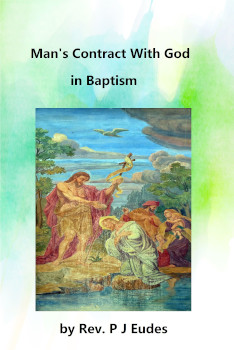





 Follow
Follow


